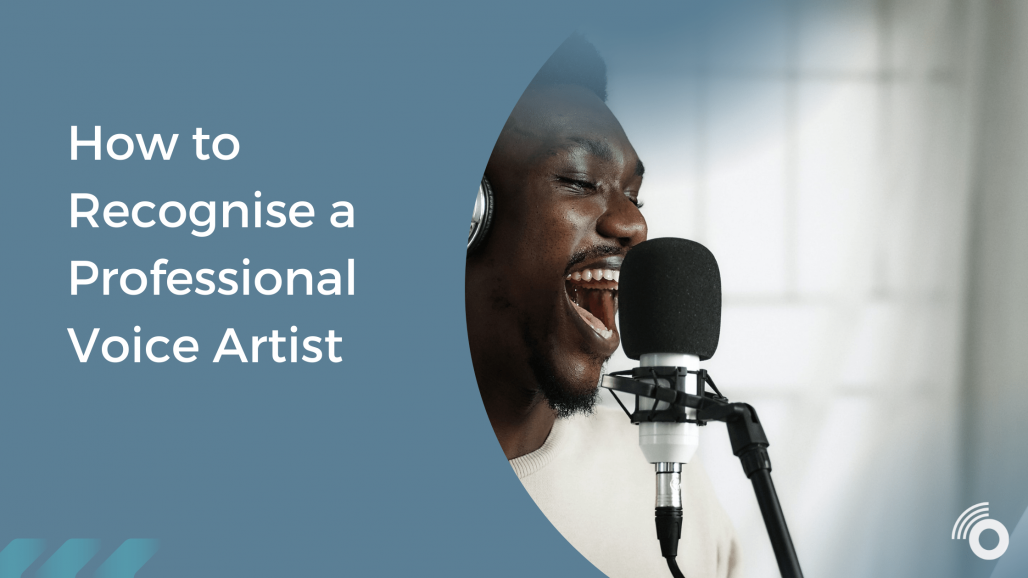How to Recognise a Professional Voice Artist
How to Recognise a Professional Voice Artist

When you’re looking for voice over talent for your project, it can be hard to know exactly how to recognise a professional voice actor. With more people working from their home studios, there’s a wide range of voices available. There are, however, several things that can help you find the perfect artist for your voice over project. Let's go through them.
Diction and Enunciation
Diction is considered one of the most important factors when it comes to good vocals. Good diction doesn’t only communicate; it can also help evoke specific emotions in an audience. Suppose you ask for and receive a few demo reels, how do you know when someone has the correct diction? Well, one thing to pay attention to, is the ends of words. Are these being pronounced properly? Can they be easily understood? Phrasing and timing are powerful tools for a voice over artist too. A pause can build tension, it implies suspense. When someone hears a pause, they tend to pay more attention to what follows. High-quality diction, tempo, and articulation will help you recognise a professional voice artist.
Modulating the Tone
Voice modulation refers specifically to how a voice over artist is able to change the tone, the pitch or the loudness of speech to stress certain words. This “art of speaking” basically refers to the ability to change the rise and fall in the pitch of voice - and is one of the most powerful weapons of voice over artists. Voice modulation can be the determining difference between a captivating speech or one that the audience finds boring. Professional voice actors know how to work effectively with variation. They can stress certain powerful words and avoid “ahs” and “uhms” while sounding confident and enthusiastic. Modulation isn’t easy. It takes practice and time to master. This is why great voices can modulate theirs to fit script requirements.
Conversational Tone
Adopting a conversational tone can make a voice feel more genuine and human. This tone favours direct discourse. It’s oriented towards information but can also maintain a dynamism that uses personal nuances, idioms, and emotional connotations. More and more, the voice over industry is focusing on real voices - not just for video games but also for corporate and training videos. Conversational tone is an important competency of voice over talent. However, this ability to use everyday language (while still sounding clear and professional) shouldn’t be confused with just using a casual tone and vocabulary. People respond better to a conversation-style voice but that’s not all that’s needed. A good way to approach the requirements of a voice over job can be to try to combine conversational tone with something else. For example, conversational and professional, conversational and informative, etc.
Taking Directions
We’ve gone through some of the more technical aspects of what makes a voice over good. But there are skills and abilities that fall outside what we would describe as professional voice over abilities. An important one is a person’s ability to take directions. Or to follow what’s required while also providing input and knowing when to ask for more clarity. Whether you’re looking to hire a voice over artist for just one project or a series of recordings, it’s useful to ask the professional to give you examples of times when they were given explicit instructions and how they implemented them.
Adapting Easily to Different Projects
Any talent looking for a voice over job is probably aware that voice recordings are needed for a large variety of projects. A professional pursuing a voice over acting career should know how to adapt to a number of different styles. It’s definitely not the same to do voice overs for a video game, an e-learning project, an audiobook, or a phone message. Each of these has different requirements. This is why it’s essential that the actor knows how to adapt their reading style to convey their messages as best as possible.
Improvising
Lastly, voice over actors should be able to improvise. This is particularly important during dubbing sessions. While in most cases actors will be required to follow a script, there are times when a little improvisation can enhance creative and emotional skills - and will save time later when doing audio editing. Many voice over professionals practise their improvisation skills to be more flexible at auditions and switch out of different voices more quickly. Others like to add some humour to their performance or need to react quickly to the last sound or visual prompt, especially while doing ADRs (Automated Dialogue Replacement). The best voices will know how to match the feel of a scene - and this is the mark of a great voice over talent.
Newsletter
Stay up to date with news and special offers. Get to know our new actors and features
NEED HELP?
Visit Frequently Asked Questions page or send us a question.

comments
Comment